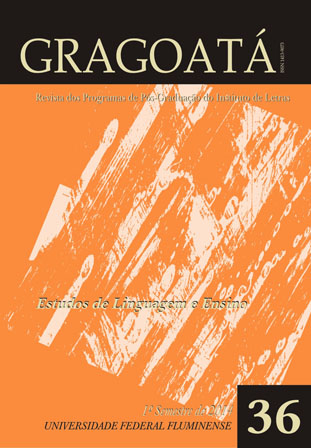Desafios para a área da linguagem
DOI:
https://doi.org/10.22409/gragoata.v19i36.32984Palavras-chave:
Linguagem. Ensino. Diversidade textual. Desenvolvimento de proficências.Resumo
Considerando os índices alarmantes em relação ao desenvolvimento da proficiência dos estudantes brasileiros, que exemplificam o fracasso educacional do Brasil, propomo-nos a uma reflexão acerca da importância da linguagem para a formação básica do estudante. Postula-se que dominar a linguagem significa estar mais preparado para interagir com outras pessoas, o que implica ter a possibilidade de influenciar no modo de agir e pensar do outro. Na perspectiva de base (sócio) cognitivista, acredita-se em um processo educacional que interpreta os indivíduos como sujeitos sociais, que não são prontos, mas se (re) constroem discursivamente. Por isso, a escola tem função primordial de ampliar o domínio linguístico do aluno, para que seja capaz de participar ativamente da sociedade em que está inserido. A consequência dessa concepção é o entendimento de que a diversidade textual em suas diferentes organizações e finalidades se constitui no grande objeto de estudos da sala de aula para o desenvolvimento da leitura, da escrita e da análise discursiva. A linguagem, nessa perspectiva, é o grande patrimônio linguístico que deve ser explorado não, apenas, nas aulas de língua materna, mas em todas as disciplinas, incentivando o caráter científico, tributo da área dos estudos linguísticos.
Downloads
Downloads
Publicado
Como Citar
Edição
Seção
Licença
AUTORIZAÇÃO
Autores que publicam em Gragoatá concordam com os seguintes termos:
Os autores mantêm os direitos e cedem à revista o direito à primeira publicação, simultaneamente submetido a uma licença Creative Commons Atribuição 4.0 Internacional (CC BY 4.0), que permite o compartilhamento por terceiros com a devida menção ao autor e à primeira publicação pela Gragoatá.
Os autores podem entrar em acordos contratuais adicionais e separados para a distribuição não exclusiva da versão publicada da obra (por exemplo, postá-la em um repositório institucional ou publicá-la em um livro), com o reconhecimento de sua publicação inicial na Gragoatá.
A Gragoatá utiliza uma Licença Creative Commons - Atribuição CC BY 4.0 Internacional.














